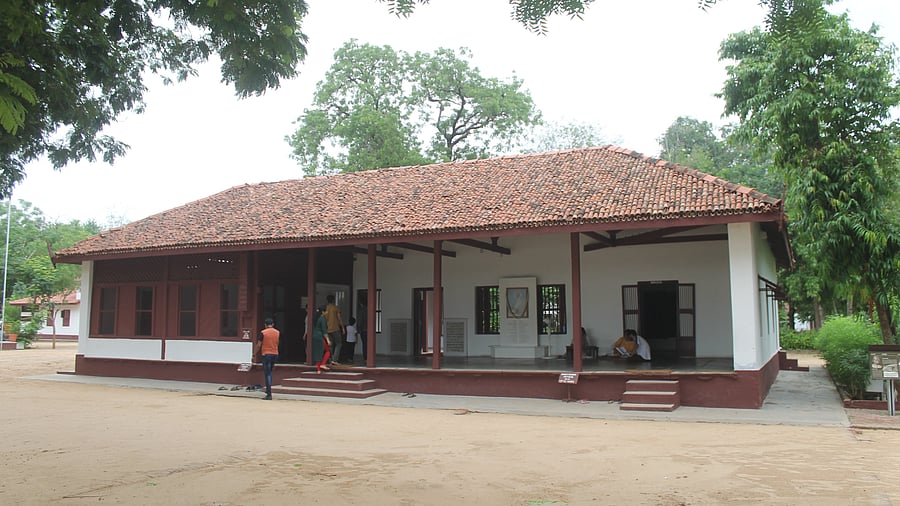
Over the past several hearings on a Public Interest Litigation (PIL) questioning the Rs 1,200 crore redevelopment of Mahatma Gandhi founded-Sabarmati Ashram in Ahmedabad, one aspect which became clear is that the trusts are not opposed to the idea of revamp.
All of these trusts, who jointly own the land, have given their in-principle approval for the government project.
The state government, in response, while seeking to dismiss the PIL said that all these trusts, "mature and oldest", never came to file petition and "reposed confidence" in the state government's plan.
However, what has been red flagged by the petitioner and a Gandhian organisation during the hearings is the question of autonomy of existing trusts, which is said to have been jeopardised with the creation of a whole new trust -- Mahatma Gandhi Sabarmati Ashram and Memorial Trust (MGSAMT) -- dominated by state government representatives. This new trust has been set up to implement the "Gandhi Ashram Memorial änd Precinct Development Project".
The High Court on Friday concluded the hearing and posted the litigation to August 18 for further proceeding.
The governing council of MGSAMT has the Chief Minister as its chairman, followed by Chief Secretary and Chief Principal Secretary to Chief Minister as members, Secretary, (Tourism, Devsthan Management, Civil Aviation and Pilgrimage) as member-secretary. BJP leaders -- Rajya Sabha MP Narhari Amin and Lok Sabha MP Dr Kirti Solanki -- have been appointed as its members along with Maljibhai Desai, Kartikey Sarabhai, Sudarshan Iyenger and Jayesh Patel who are trustees of Gujarat Khadi Gramodyog Mandal, Sabarmati Ashram Memorial and Preservation Trust (SAMPT), Sabarmati Ashram Gaushala Trust and Sabarmati Harijan Ashram Trust (SHAT) respectively.
The government's resolution, as pointed out by lawyers of the petitioner, Tushar Gandhi, as well as Gandhi Smarkat Nidhi (GSN), an umbrella of Gandhian organisations which is a part in the ongoing litigation, during the hearing states, "The Governing Council at any time shall consist of not less than (7) seven members but not more than (20) twenty members for such number of members (including non-officials) as may be decided by the Governing Council or State Government from time to time''.
The lawyers have raised concerns that this trust has the potential to undermine the autonomy of the existing trusts.
"I am an independent Gandhian institution and I have no objection to the redevelopment plan. But, in public interest, there is one point in the entire scheme which is creating some apprehension, there is some likelihood of prejudice which may be caused to the autonomy of the trust, which we want to bring to your lordship's attention,'' said advocate Aayog Doshi, who represents GSN, a Delhi-based autonomous Gandhian organisation.
When the division bench, headed by Chief Justice Aravind Kumar, sought to know what the basis of his apprehension was, Doshi responded, "As per the objective of MGSAMT, it also has the power to sell, lease, transfer and dispose of, hire or give on rent all assets of the society. If the publically avowed intention of the state government is that redevelopment is only to augment the facilities, this is the clause which we feel causes the apprehension."
Similarly, Tushar Gandhi's lawyer Bhushan Oza also told the bench that the apprehension over the power of MGSAMT is based on the fact that it can be expanded to 20 members and "majority of them may not be representing the trusts (such as SAMPT) or may not have Gandhian background''.
He said because of these aspects questions over "maintaining Gandhian values, ethos, and their enhancement arose''. Oza also added that "we are before the court because there should not be unchecked authority to remove representative of six trustees (like SAMPT, SHAT, among others)''.
Advocate-general, Kamal Trivedi, responded in his concluding remark that respondents from 3 to 7 (such as SAMPT and SHAT) are the "mature and oldest trusts" and none of them came to petition. Seeking dismissal of the PIL, Trivedi added that these trusts have "reposed confidence in us and we won't like policing by the petitioner or respondent no-2 (GSN)''.
